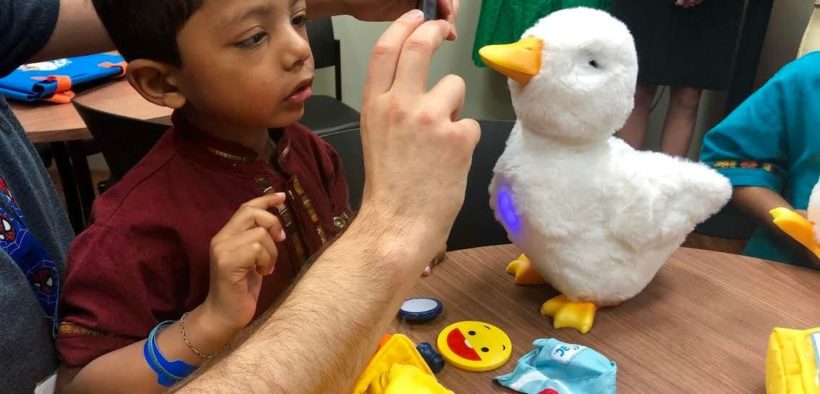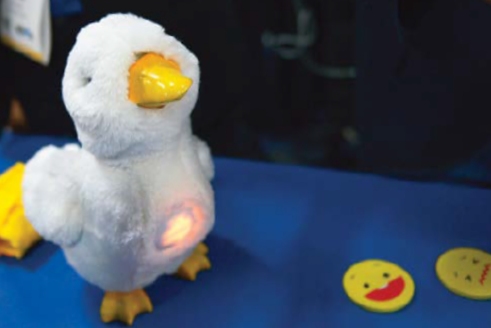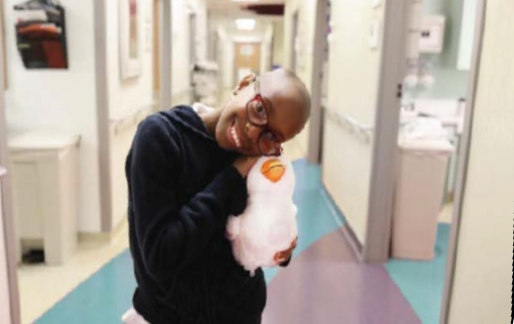Hope Goes Quack, Quack

Children coping with cancer will have a new companion, My Special Aflac Duck, to see them through their arduous struggle.
BY Aatika H Jain
Statutory warning: The following article might contain graphic details that could leave you with warm, fuzzy feelings. What happens if an empathetic child struggles with a health issue for several years? He grows up into Aaron Horowitz. The co-founder and CEO of the health-focused technology company, Sproutel, is “passionate about how we can improve the way healthcare is delivered, especially to kids.” Aflac, an insurance company, has espoused the cause of families with children suffering from cancer for several decades now. When Aflac’s Childhood Cancer Campaign met Horowitz’s dedication to alleviating children’s experience with illnesses, My Special Aflac Duck was born.
Heart winner and award winner
The cuddlesome, delightful little duck toy stole hearts at the world’s largest gadget trade show, the Consumer Electronics Show 2018, in Las Vegas. It went on to win the esteemed Tech for a Better World Innovation Award. But My Special Aflac Duck is not just another toy. It is a social companion robot developed to comfort young children battling with cancer. “Kids are really comforted by practicing their medical procedures through play therapy. The focus for us is on helping children emotionally cope and supporting them through really stressful times,” explains Horowitz.
My Special Aflac Duck is an animatronics duck equipped with sensors on its back, cheeks and under its wings. Kids can cuddle with it, tickle it, and the duck will merrily wobble its head, quack and hug back. It dances and nuzzles to elevate kids’ moods. With the help of an augmented reality app, they can even give it a bath, dry it, and feed it. The Aflac duck turns them into caregivers and affords them a semblance of control in their lives.
My Special Aflac Duck is an animatronics duck equipped with sensors on its back, cheeks and under its wings.
When kids suddenly find themselves diagnosed with cancer they “lose such a tremendous amount of control. They’re diagnosed, they’re taken out of school, they go into what is on average, a thousand days of treatment, three days a week at their cancer center to get chemotherapy,” elaborates Horowitz. He affirms that the Aflac duck is a way for kids to control their experience.
The duck can imitate its owner’s emotions through its RFID cards. When its circular chest sensor is tapped with the emoji tags, its emotions can change over a myriad range of emotions like sad, nauseous, angry, silly, happy and so on to mimic the child’s emotional state. Its body language and behavior change, with different sounds and expressions for every mood.

Aaron Horowitz
CEO, Sproutel
It seeks to make the treatment less terrifying for the kids by letting them administer IV fluids and chemotherapy routines on it. In the IV mode, its head generates calming pulses similar to heartbeats to soothe the kids, encouraging them to practice steady breathing exercises.
One of the RFID tags, a rocket ship, is designed to calm down the kids and help them sleep by playing ambient music and sounds of their choice, ranging from rainforest to an amusement park, a garden, a sea and more. The outer plush coat can be removed for washing, making it convenient to keep the toy clean and germ-free between several hospital visits.
One of the RFID tags, a rocket ship, is designed to calm down the kids and help them sleep by playing ambient music and sounds of their choice, ranging from rainforest to an amusement park, a garden, a sea and more. The outer plush coat can be removed for washing, making it convenient to keep the toy clean and germ-free between several hospital visits.

The Journey
A young Aaron was diagnosed with human growth development deficiency syndrome, and for five years, he had to be administered injections every day. This difficult childhood experience inspired him to co-start the research and development company, Sproutel, in Rhode Island, USA.
Aflac Cancer and Blood Disorders Center of Children’s Healthcare of Atlanta, USA, is one of the major hospitals that treat cancer in children. Since 1995, Aflac has been taking care of the financial needs of the hospital, shelling out more than $120 million for the cause.
Aflac contacted Sproutel after it heard about Sproutel’s other product, Jerry the Bear, a companion robot for type-1 diabetic children. “Each year more than 15,000 kids are diagnosed with cancer in the US,” explains Horowitz, “So we thought about the need for emotional comfort and now we have the opportunity to bring the latest in social robotics into the field of medicine, bringing comfort and joy through this talking process.” The Aflac duck has already turned into a familiar figure in the US.
Horowitz and his team aimed to bring this mascot to life as a comforting companion for kids suffering from cancer. “By the time the duck ships, we’d have spent 18 months of designing, testing and iterating with families, doctors, and experts,” claims Horowitz. Witnessing the children use the duck, thus, becomes even more rewarding. Although the cost of producing a duck comes up to $200, Aflac gives it out for free to young patients throughout the country. It is anticipated to be launched across the US by the end of the year.
“Seeing the struggle that these families go through on a day to day basis is what wakes us up in the morning to create something that can make life a little bit easier,” asserts Horowitz. Together, Aflac and Sproutel are envisioning a cheerful and hope-filled future for kids, one brimming with happy laughs and quacks.

















Hi, i foud https://wecanservemagazine.com very useful.
The Hope Goes Quack, Quack page it is well written and has helped me a lot.
I and my friends Berry and AlvaroSloan used the best product to lose weight and to be fit in summer.
Now we have forgotten the ugly fat and we are glad of our weight.
Now I feel beautiful and attractive.I am so happy!!! 🙂 If you are interested for yourself, enter:
https://s96.me/fit . Kiss you All!